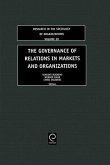This book conducts a survey into the ways in which the word 'network' has been deployed in a wide range of literature. In particular, it offers a commentary on how the idea of networks has been used to illustrate contemporary forms of socio-economic organization broadly conceived to also include the political aspects of networks. The book brings some intellectual clarity to the discussion of networks by asking whether it is possible to construct a clearly demarcated idea of a network as a separable form of socio-economic coordination and governance mechanism with its own consistent logic. In doing this, the primary contrast is with hierarchies and markets as alternative and already well understood forms of socio-economic coordination each with their own distinctive logic.








